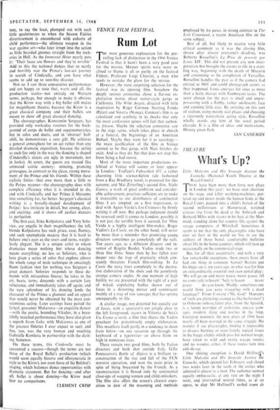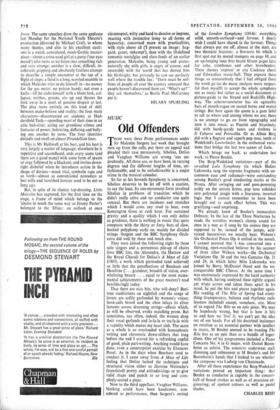THEATRE
What's Up?
FrilERE have been more than forty new plays I in London this year: we have seen abortion on the stage, and killer washing-machines, pot- tered up and down inside the human body at the Royal Court, peeped into a child's fiction of the second millennium at Hampstead, watched corpses rise from the dead at the Aldwych and Bernard Miles with straws in his hair at the Mer- maid, standing alone for country life against the savage computers of Whitehall. Sometimes it seems to me that the only playwrights who have ever set foot in the world we live in are the authors of those banal. comfortable bulletins about life in the home counties, which still turn up occasionally on the commercial stage.
But, for all their eccentricity, and with a very few remarkable exceptions. these pieces have all had one thing in common. Samuel Beckett put his finger on it, ten years ago. in what was for him an extraordinarily eventful and even genial play: 'We will go on and never pause, never pause, till we come safe to haven."Safe to haven . . . never pause . . do you know. Maddy. sometimes one would think you were struggling with a dead langnage?' From Coward ('My God! Moments of truth are clattering around us like hailstones! ') to Osborne (whose. latest play, from the Spanish, is a lumpy porridge of archaisms, uneasy coin- ages. modern slang and poetics in the limp, Georgian manner). the new plays of 1966 have nearly all been worsted in the same struggle. No wonder if our playwrights, finding it impossible to discuss burning or even faintly topical issues in the baggy cliches which pass for normal usage, have taken to wild and twisty escape routes; and no wonder, either, if these routes turn into cull-de-sac.
One shining exception is David Halliweks Little Malcolm and His Struggle Against the Eunuchs, which opened last February and closed two weeks later in the teeth of the critics who admired it almost to a man. The audience seemed equally enthusiastic, at any rate on the night I went, and interrupted several times, as at an opera, to clap Mr Halliwell's verbal tours de
force. The same speeches drew the same applause last Monday for the National Youth Theatre's production (directed by Michael Croft, to whom many thanks, and also to his excellent cast): one is a weird, convoluted, mock-Gothic master- piece—about a cross-eyed girl at a party (`our eyes mated') who turns as we listen into something rich and very strange; another is a slow, difficult, in- coherent, gripping and absolutely fruitless attempt to describe a simple encounter at the top of a flight of steps; a third is a long, worried mumble in which Malcolm tries to do himself in—no money for the gas meter, no poison handy, „not even a knife—till he stabs himself with a blunt fork, col- lapses, writhes, groans, sits up and throws the fork away in a spurt of genuine despair at last. The play turns entirely on this kind of shift between make-believe and reality; the four main characters—discontented art students at Hud- dersfield Tech.—spending most of their time in an attic bed-sitter, acting out grandiose crimes and fantasies of power, bolstering, deflating and bully- ing one another by turns. The four identities dwindle and swell on almost Pirandellian lines.
This is Mr Halliwell at his best, and his best is very largely a matter of language; elsewhere he is repetitive and secondhand, ends every scene (and there are a good many) with some form of spasm or orgy followed by a blackout, and invites down- right disbelief when he introduces action in the shape of devices—mock trial, symbolic rape and so forth—almost as conventional nowadays as lost wills and tarnished honour used to be not so long ago. "
But, in spite of its clumsy top-dressing, Little Malcolm has captured, for the first time on the stage, a frame of mind which belongs to the 'sixties in much the same way as Jimmy Porter's belonged to the 'fifties : an outlook at once circumspect, witty and hard to deceive or impress, reacting with instinctive irony to all forms of hypocrisy, concerned more with practicalities, with style above all ('I present an image : hag- gard, gaunt, unkempt'), than with the ill-defined romantic nostalgias and class-feuds of an earlier generation. Malcolm, being young and preter- naturally shy with girls, is angry of course, and ostensibly with the world that has denied him his birthright; but privately he can see perfectly well where the trouble lies: 'There must be mil- lions of people all over the country annoyed that people haven't discovered them yet. "What's up?" they ask themselves,' as Beatle Paul McCartney put it.
HILARY SPURLING



































 Previous page
Previous page